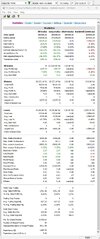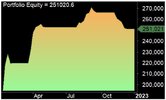- Joined
- 25 July 2021
- Posts
- 891
- Reactions
- 2,253
The main advantage of a mechanical trading system over a discretionary system that can result in you gaining more money from the system;
There is less for a trader to think about when trading the system so you don't have to think too deeply about what the market is doing at the time you are placing orders.
The main disadvantage of a mechanical trading system over a discretionary system that can result in you losing more money from the system;
There is less for a trader to think about when trading the system so you don't have to think too deeply about what the market is doing at the time you are placing orders.
There is less for a trader to think about when trading the system so you don't have to think too deeply about what the market is doing at the time you are placing orders.
The main disadvantage of a mechanical trading system over a discretionary system that can result in you losing more money from the system;
There is less for a trader to think about when trading the system so you don't have to think too deeply about what the market is doing at the time you are placing orders.


